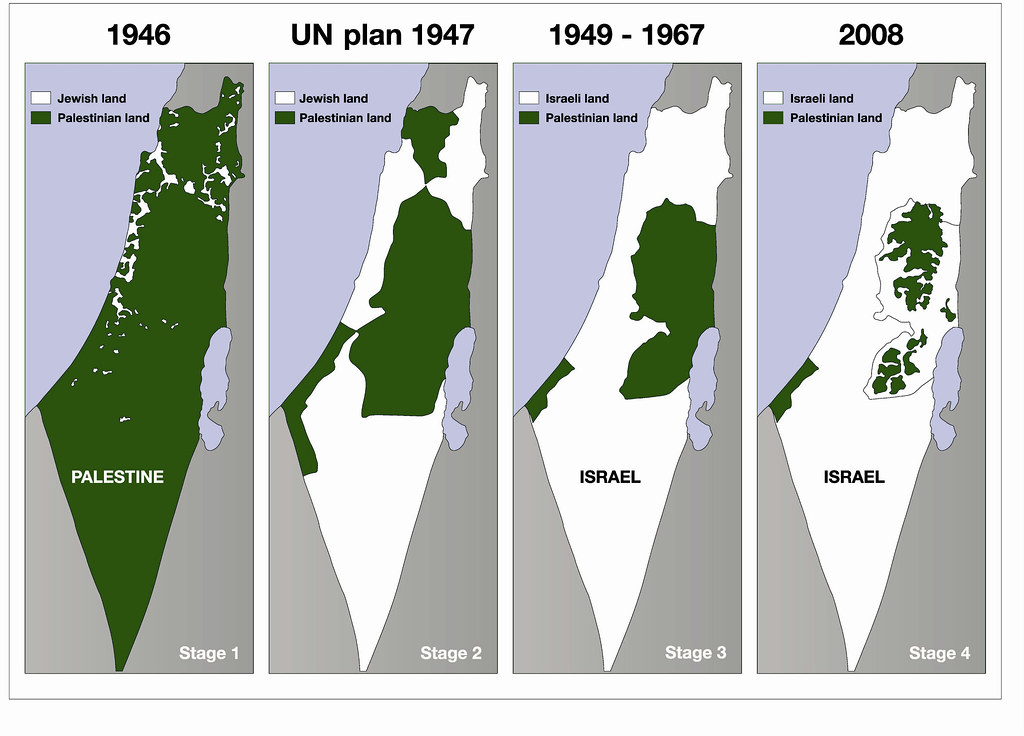Although people long for peace between Israel and Palestine, the current clash between the two states has deep religious roots, which some believe to be irreconcilable. In essence, both Israelis and Palestinians feel entitled to the lands between the Jordan River and the Mediterranean Sea, as the area contain sites of spiritual significance to their Judaism and Islam. According to Jewish tradition, Jerusalem was the capital of King David’s Israel and the site of Solomon’s Temple, while Palestinians, who are predominantly Muslim, believe Jerusalem to be the final place that the Prophet Muhammad visited before he ascended to heaven.
Throughout history, the region has shifted between Christian, Jewish, and Muslim political control, with tensions escalating in the early nineteenth century.
Early 19th Century:
As Jews faced widespread persecution in Russia and Europe, many sought to establish a Jewish nation as a safe haven for the followers of their faith. Ultimately, this laid the foundations for the Zionist movement, founded by Theodor Herzl in 1897, which called for a Jewish state in Palestine, an area with a predominantly Arab population. Mainly, this Zionist movement came into effect in the years following World War I, sparking tensions between Jews and Arabs.
World War I & II:
Prior to the outbreak of World War I, the Ottoman Empire controlled Palestine, which had a 90% Arab population. As their power began to wane in the early twentieth century, the empire joined the Central Powers of Germany and Austria-Hungary in an attempt to reassert their authority.
Presuming the defeat of the Ottoman Empire, Great Britain made promises to both Jews and Arabs, many of which they failed to honor.
In 1916, Great Britain and France agreed to grant the Arabs control of Ottoman territory after the war, as long as they revolted against the Ottoman Empire. Specifically, Sir Henry McMahon promised that Britain would “recognize and support the independence of the Arabs in the region” since the Arabs fulfilled their end of the agreement by rebelling against the Ottoman Turks.
In spite of this declaration, Britain formed a post-war agreement with France, dividing the Ottoman region into “spheres of influence” controlled by the two European powers. However, seeking to support the Zionists and establish British preeminence in the region, the British reneged on their agreement with the French and issued the Balfour Declaration in 1917, in which they pledged support for “the establishment in Palestine of a national home for the Jewish people.” Although the declaration stipulated that “nothing shall be done which may prejudice the civil and religious rights of existing non-Jewish communities in Palestine”, the document gave hope to the Zionist movement and irritated the Palestinian Arabs.
Ultimately, the Allied Powers prevailed in the war, and Great Britain found themselves with promises to both groups that they needed to uphold. Yet, instead of honoring their agreement with the Arabs, the British captured Palestine for themselves and set up a mandate system. Under British control, a large influx of Jews migrated to Palestine, exacerbating tensions with the established Arab population in the region, who already felt betrayed by the British.
Then, after the devastations of the European Holocaust, surviving Jews from concentration camps sought refuge in Palestine, further increasing immigration and conflict between Jews and Arabs. In response to this conflict, the British began to turn the Jews away, as they feared that it would disrupt their established oil trade with the Arabs.
Independence of Israel (1948):
Following World War II and amid these ongoing tensions, the United Nations General Assembly passed Resolution 181 in 1947, which called for the region to be divided into one independent Arab state and one Jewish state, with Jerusalem remaining under the control of the UN. Both sides opposed and refused to recognize this plan, leading violent conflicts to persist.
Wary of the discord between the Jews and Arabs, the British surrendered their mandate over Palestine to the UN, and Israel then proclaimed its independence on May 14, 1948. This declaration inspired surrounding Arab states and Palestinians to attack Israel, marking the beginning of several costly Arab-Israeli wars. Israel ultimately won this conflict and expanded their territory, leading to the flight and expulsion of 700,000 Palestinian Arabs from Israel. However, Egypt and Jordan still maintained control of the Gaza Strip and the West Bank respectively.
Remainder of 20th and 21st Century:
Throughout the majority of the twentieth century, tensions increased between the two groups in a multitude of events, such as the Suez Canal Crisis (1956), the Six-Day War (1967), the Munich Olympics Massacre (1972), and the Yom Kippur War (1973). Following the Six-Day War, Israel acquired the Palestinian Arab territories of the West Bank, Gaza, East Jerusalem, and the Sinai Peninsula, ultimately leading to the First Intifada, or Palestinian uprising, in 1987.
After this uprising, the countries entered brief peace negotiations in 1993 through the signing of the Oslo Accords between Israel and the Palestine Liberation Organization (PLO). This agreement expanded Palestinian self-rule in the West Bank and the Gaza Strip; however, it left key issues unresolved such as the status of Jerusalem and the Israeli settlements in the West Bank. Soon after the Oslo Accords, the Second Intifada broke out in 2000, with conflict lasting until 2005.
In 2005, Israel withdrew its troops from Gaza, and a Palestinian militant group known as Hamas took over the Gaza Strip in 2007 intending to replace Israeli rule with an Islamic state. Ever since Hamas seized power, Israelis and Palestinians have both launched armed, violent attacks and inflicted major casualties on each other. These skirmishes eventually led Benjamin Netanyahu, the current prime minister of Israel, to declare war on Hamas on October 8th, 2023, after their surprise attack on Israel on the 50th anniversary of the beginning of the Yom-Kippur War.
Ultimately, due to the deep religious causes of this conflict, in which both sides lay claim over the same holy territory, it’s difficult to envision reconciliation in the immediate future. Adding to this unlikelihood of a resolution is the fact that Israel re-elected hard-liner Netanyahu in December 2022, a figure who has created the most far-right government in Israeli history. However, people across the globe remain hopful that a peaceful end of this destructive conflict can be found.


























